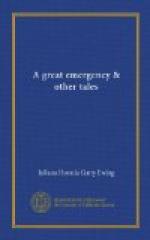Johnson—or Fred, as I used to call him by this time—only exaggerated the truth about the shrubs that grow in the greenhouse atmosphere of South Devon, when he talked of the captain’s fuchsia trees being as big as the old willows by the canal wharf; but the parrots must have been a complete invention. He said the captain had seven. Two green, two crimson, two blue, and one violet with an orange-coloured beak and grey lining to his wings; and that they built nests in the fuchsia trees of sandal-wood shavings, and lined them with the captain’s silk pocket-handkerchiefs. He said that though the parrots stole the captain’s handkerchiefs, they were all very much attached to him; but they quarrelled among themselves, and swore at each other in seven dialects of the West Coast of Africa.
Mrs. Johnson herself once showed me a little print of Dartmouth harbour, and told me it was supposed that in old times an iron chain was stretched from rock to rock across its mouth as a means of defence. And that afternoon Fred told me a splendid story about the chain, and how it was made of silver, and that each link was worth twenty pounds, and how at the end where it was fastened with a padlock every night at sunset, to keep out the French, a lion sat on the ledge of rock at the harbour’s mouth, with the key tied round his neck by a sea-green ribbon. He had to have a new ribbon on the first Sunday in every month, Fred said, because his mane dirtied them so fast. A story which Fred had of his grandfather’s single-handed encounter with this lion on one occasion, when the gallant captain would let a brig in distress into the harbour after sunset, and the lion would not let him have the key, raised my opinion of his courage and his humanity to the highest point. But what he did at home was nothing to the exploits which Fred recounted of him in foreign lands.
I fancy Fred must have read some real accounts of South America, the tropical forests, the wonderful birds and flowers, and the ruins of those buried cities which have no history; and that on these real marvels he built up his own romances of the Great Stone City, where the captain encountered an awful race of giants with no legs, who carved stones into ornaments with clasp-knives, as the Swiss cut out pretty things in wood, and cracked the cocoa-nuts with their fingers. I am sure he invented flowers as he went along when he was telling me about the forests. He used to look round the garden (which would have satisfied any one who had not seen or heard of what the captain had come across) and say in his slow way, “The blue chalice flower was about the shape of that magnolia, only twice as big, and just the colour of the gentians in the border, and it had a great white tassel hanging out like the cactus in the parlour window, and all the leaves were yellow underneath; and it smelt like rosemary.”
If the captain’s experiences in other countries outshone what had befallen him in his native land, both these paled before the wonders he had seen, and the emergencies he had been placed in at sea. Fred told me that his grandfather had a diving-bell of his own on board his own ship, and the things he saw when he went down in it must have made his remembrances of the South American forests appear tame by comparison.




